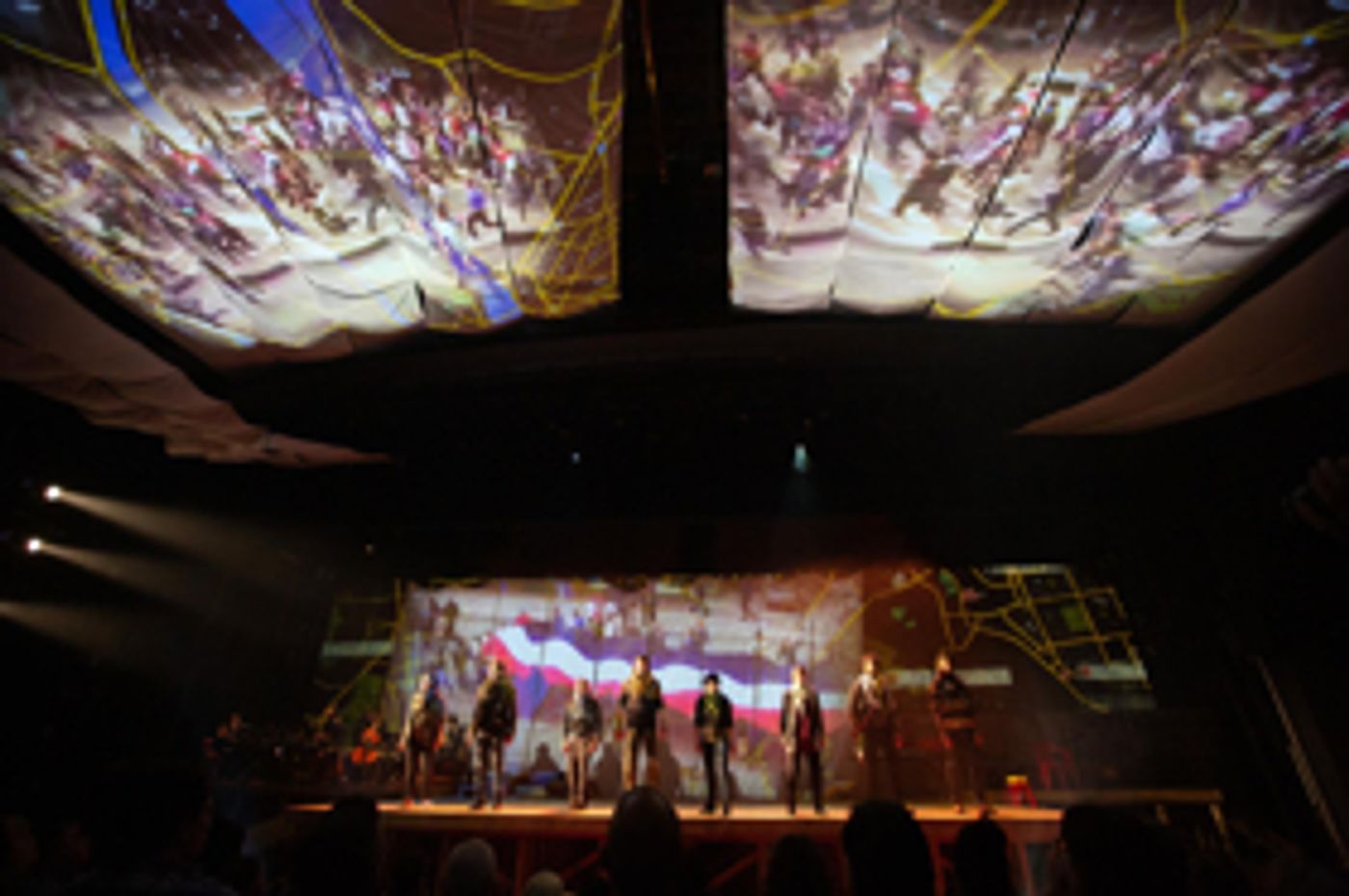Review: WE LIVE IN CAIRO: You Say You Want a Revolution

We Live in Cairo
Book, Music and Lyrics by Daniel Lazour & Patrick Lazour, Directed by Taibi Magar; Choreography, Samar Haddad King; Music Supervision, Michael Starobin; Music Director, Madeline Smith; Scenic & Costume Design, Tilly Grimes; Lighting Design, Bradley King; Sound Design, Kai Harada; Projection & Video Design, David Bengali; Vocal Arrangements, Daniel Lazour & Madeline Smith; Orchestrations, Daniel Lazour & Michael Starobin; Casting, Stephen Kopel, CSA; Production Stage Manager, Taylor Brennan
CAST (in alphabetical order): Sharif Afifi, Abubakr Ali, Jakeim Hart, Dana Saleh Omar, Gil Perez-Abraham, Parisa Shahmir; Ensemble: Waseem Alzer, Layan Elwazani; Band: Madeline Smith, Naseem Alatrash, Kate Foss, Bengisu Gökçe, Nacho González Nappa, Ghassan Sawalhi, Jeremy Smith
Performances through June 23 at American Repertory Theater, Loeb Drama Center, 64 Brattle Street, Cambridge, MA; Box Office 617-547-8300 or www.americanrepertorytheater.org
Brothers Daniel and Patrick Lazour have found a creative home at the American Repertory Theater for the world premiere of their musical We Live in Cairo. In collaboration with Director Taibi Magar and Choreographer Samar Haddad King, the Lazours have continued to develop the book, music, and lyrics in the supportive incubator of the A.R.T. following workshops at the Eugene O'Neill National Music Theatre Conference (2015) and the New York Theatre Workshop (2016 Richard Rodgers Award). Infused with their own cultural experiences, the knowledge gained from their research and travels, and the influence of generations of protest music, We Live In Cairo is an amalgam of the personal and the political, combining 21st century technology with good old-fashioned songwriting and storytelling techniques.
Young people making change, using their innate passion and youthful energy, is the driving theme in We Live in Cairo. Think of the squatters in Rent, the students in Les Miserables, and even the founders in Hamilton. A group of committed revolutionaries seeks to overthrow the status quo for human rights, freedom, equality, and opportunity. In this case, the Lazour brothers were inspired by a photograph of young Egyptians who took to the streets in 2011 to oust President Hosni Mubarak. The protests in Tahrir Square in Cairo grew from hundreds to thousands of demonstrators, lasting eighteen days, before forcing the end of the 30-year regime. The musical chronicles the uprising and its aftermath in a compelling, yet uneven, production.
Magar's vision for the world of the play is effectively rendered by the scenic and costume designs of Tilly Grimes, lighting design by Bradley King, projection and video designs by David Bengali, and Kai Harada's sound design. The interior of a warehouse, graffiti-covered walls, and small spaces defined by darkness and spotlights set the scene for the clandestine meetings of the protesters. When the small group goes out to the public square, swaths of fabric unfurl overhead, upon which are projected video of massive crowds, figuratively enlarging their numbers and encompassing the audience as part of the demonstration. The upstage wall becomes an enormous screen with dueling social media messages, newscasts, and headlines updating the activity in real time while clamoring for our attention.
Meanwhile, the Lazours' score fuels the protests, while fulfilling the requisite component of advancing the story. Music Director Madeline Smith (keyboard) leads the onstage band, featuring oud and percussion that lend Arabic authenticity to the sound, and gives the feeling of the pervasiveness of the music to the cause at hand. King's choreography is dynamic and athletic, performed with brio and urgency by the young ensemble. As a unit, their strong vocals are a metaphor for their bond in their mission, while individually, many of the characters tell us who they are with their songs.
Amir (Jakeim Hart) and Hany (Abubakr Ali) play brothers who are songwriters. Hart also plays the guitar and they become the voice of the protests. Fadwa (Dana Saleh Omar) is the firebrand of the group who recruits Layla (Parisa Shahmir) to chronicle their work in photographs. Layla, a Muslim, and Amir, a Christian, become involved in a star-crossed romance, giving them the opportunity to make some beautiful music together. Karim (Sharif Afifi) is the group's graffiti artist who mentors Hassan (Gil Perez-Abraham), who also happens to be connected to the Muslim Brotherhood, an extreme Islamist group. Filling out the ensemble are Waseem Alzer and Layan Elwazani.
We Live in Cairo starts a little tentatively, but once it gathers steam, the exposition in the first act exudes tension and the danger of the situation. The character development could go deeper, but the actors do a good job of capturing their personalities, and they effectively paint a picture of what's at stake for each of them in the revolution. After intermission and the regime change, the problematic second act can be seen as a metaphor for the difficulties inherent in establishing a new government amidst burgeoning political disagreements. In their desire to show the aftermath of the 2011 revolution, the authors cannot adequately portray in depth all that happened so rapidly in the next three or four years, and the resulting overview left me wanting and needing more. On the plus side, the actions of these young people with grit inspire hope that national anger and a coalition of groups can succeed in making changes, and hopefully for the better.
Photo credit: Evgenia Eliseeva (The Cast of We Live in Cairo)
Reader Reviews

Videos

